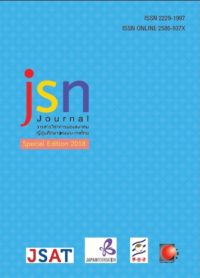Conflicts between Husband and Wife in the Noh Play, Ashikari
Main Article Content
Abstract
story was about a couple who were parted by poverty. The wife went to capital city to work in a nobleman’s household. After she gained more money, she came back to hometown to find Kusaka Saemon, her husband. She found that he lived on cutting and selling reeds. When they met, her husband felt embarrassed about his job so he did not show up and hid in a hut. The wife followed him and tried talking to him until he came out. And finally, they went to the capital together.
This research’s objective is to study conflicts between husband and wife and resolution to the problem in Noh Play, Ashikari. The research found that the conflict between the characters in the play resulted from the husband’s feeling of inferiority due to his lower living standard. The wife solved this by confronting the problem using her promise in the past and poems as tools to negotiate with him to make him accept her. Ashikari reflected that society at that time expected men’s roles to be superior to women’s. It also showed
influence of poetry over mind to drive change in people’s feeling and attitude.
Article Details
ข้อความและข้อคิดเห็นต่างๆ ในบทความเป็นของผู้เขียนบทความนั้นๆ ไม่ใช่ความเห็นของกองบรรณาธิการหรือของวารสาร jsn Journal
References
นพมาส แววหงส์. (2558). ปริทัศน์ศิลปะการละคร.กรุงเทพฯ : โครงการเผยแพร่ผลงานวิชาการคณะอักษรศาสตร์ จุฬาลงกรณ์มหาวิทยาลัย
สัจจะ. (2558, 20 พฤศจิกายน). ในวิกิพีเดียสารานุกรมเสรี. สืบค้นเมื่อ 15 ธันวาคม 2560, จาก https://th.m.wikipedia.org/wiki/สัจจะ
สุนิศา ธรรมาวิวัฒน์. (2559). ความขัดแย้งและการแก้ปัญหาความขัดแย้งของตัวละครเอกในบทละครโนเรื่องยุยะ.ในการประชุมวิชาการระดับชาติมหาวิทยาลัยราชภัฏกลุ่มศรีอยุธยาครั้งที่ 7 (น.466-470). พระนครศรีอยุธยา : สถาบันวิจัยและพัฒนามหาวิทยาลัยราชภัฏพระนครศรีอยุธยา
วินัย จามรสุริยา. (2559). ผู้ชายกับความรักในบทละครโนของเสะอะมิ. วารสารญี่ปุ่นศึกษา, ปีที่ 33 ฉบับที่ 2,น.32-43
อรรถยา สุวรรณระดา. (2558). ประวัติวรรณคดีญี่ปุ่น.พิมพ์ครั้งที่ 2. กรุงเทพ : สํานักพิมพ์แห่งจุฬาลงกรณ์มหาวิทยาลัย
小沢正夫. (1979).『古今和歌集』小学館
佐成健太郎. (1991).『謡曲大観第1巻』明治書院


